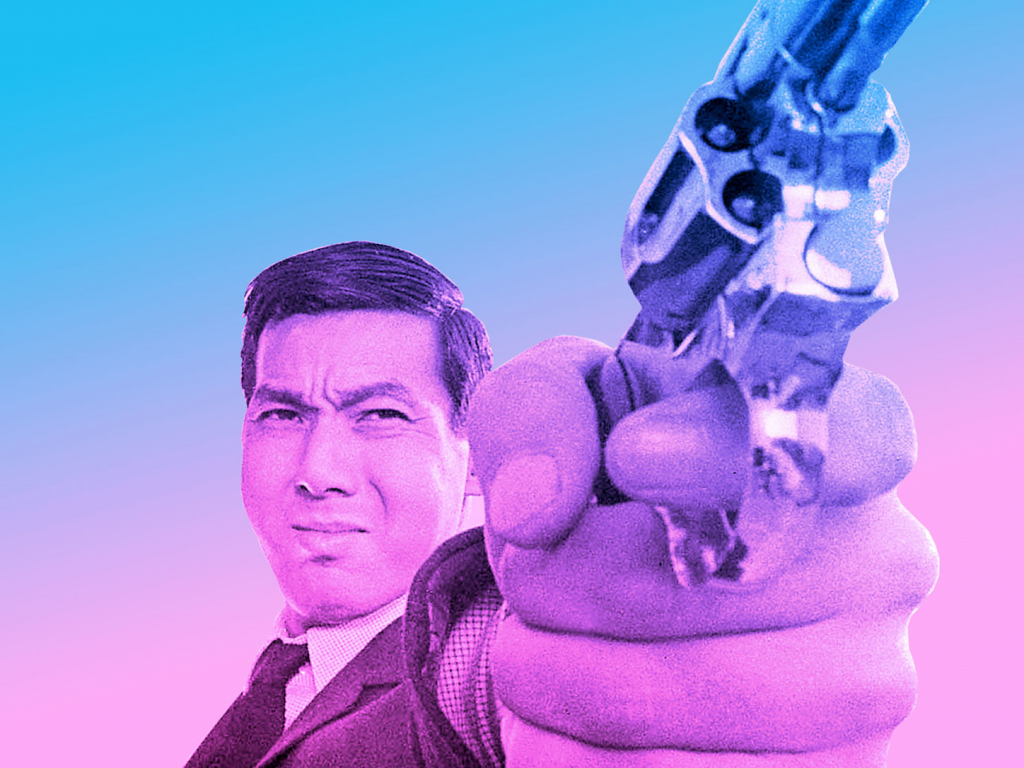On January 20, famed yakuza movie actor Joe Shishido passed away at age 86, leaving behind an impressive legacy that nonetheless sounds a bit like the result of a monkey paw wish. Joe Shishido starred in more than 300 movies and has reportedly influenced the likes of Quentin Tarantino and John Woo. At the same time, one of his most famous roles was in Branded to Kill, where he played a hit man who gets sexually aroused by smelling boiled rice. And that’s not even the weirdest story about the actor.
https://youtu.be/S7l42QSolMQ
Joe Shishido Raised Some Eyebrows (and His Cheeks)
Although today remembered mostly for his tough-guy roles, in the beginning, Shishido wanted to be a romantic movie lead. But he had trouble being taken seriously because of his sunken, hollow cheeks that, in the eyes of the studio, made him more suited to playing Skeletor in the Japanese live-action version of He-Man (if that had been a thing back then).
To get around this, in 1957 Shishido underwent surgery to artificially lift his cheekbones, giving him his trademark “tough chipmunk” look that would come to define his career. He’d star in a few romantic movies after that but eventually found his niche in action gangster films, a genre that he stuck with for the rest of his career, even after becoming a free agent once the studio that first hired him pivoted to porn films. Joe Shishido’s life and career had been many things but “boring” was never one of them.
Netflix Delivers Studio Ghibli Films to Everyone… Except You
Ghibli films simultaneously have that timeless and old-school quality to them. They can be enjoyed by pretty much everyone at any time but only as long as they have a VHS, DVD or Blu-ray player. For years, Ghibli was staunchly against offering their movies on streaming platforms, but that all changed this week when Netflix finally acquired the rights to distribute such classics as Spirited Away, Howl’s Moving Castle or My Neighbor Totoro all around the world. Except for the US, Canada and Japan.
Netflix has officially acquired exclusive streaming rights to Studio Ghibli's film catalogue for all regions outside of North America and Japan. https://t.co/8Cs7WXe6Pe pic.twitter.com/72r0IS53rM
— IGN (@IGN) January 20, 2020
This will be a huge undertaking by Netflix, who will provide new subtitles and dubs in over 20 languages for some of the greatest anime movies ever made, and the majority of people reading this will probably not have access to it. The first wave of streaming Ghibli movies should hit Netflix on February 1, so there’s still time to plan your next foreign vacation/binge session.
Prada by Uniqlo
“Women in Movies” is a new campaign by the Japanese clothing giant Uniqlo that aims to celebrate fictional female characters who faced multiple difficulties on their cinematic journeys. Just not Ellen Ripley from Alien because stories about killing acid-blood monsters are hard to translate into fashion, apparently. Instead, the campaign will put out T-shirts and sweaters featuring lines and stills from The Devil Wears Prada, La La Land and Flashdance. The T-shirts are ¥1,650 while the sweaters go for ¥2,189.
I’d better buy them all! #UniQlo Women in Movies collection. #Flashdance @jenniferbeals 😘 pic.twitter.com/OnGEoujrPe
— JBCN (@jenniferbealscn) January 21, 2020
Japan’s New TV Lineup is Sick
If you’re a fan of Japanese TV shows about doctors and hospitals, then this past week must have been a happy time for you. Things kicked off on January 17 with the premiere of the TBS show Byoshitsu de Nembutsu o Tonaenaide Kudasai (~”Please Don’t Chant Buddhist Prayers in the Hospital”), which tells the story of a doctor who is also *spins wheel of random TV set-ups* a Buddhist monk? Sure, let’s go with that. Played by Ito Hideaki, the monk-doctor (monktor?) Matsumoto Shouen is an emergency room physician who also performs Buddhist prayers for the deceased, causing him to often greet new patients in his monk robes and making them think they’ve died. The series is not a comedy.
https://youtu.be/cpDFhpJE5mA
Then on January 18 we witnessed the start of the new NHK series Kokoro no Kizu wo Iyasu to Iu Koto (~”Healing the Wound of the Heart”) starring Tasuku Emoto, part of the prominent Emoto acting family, who plays a psychiatrist. But then the series switches to the Great Hanshin Earthquake before changing things up again to a story about cancer. In the end, though, the focus does remain on the psychological impact left on people by disasters and tragedies, and it’s nice to see Japan’s biggest broadcaster tackle such an important topic.
Oh, and, there’s also the TV Tokyo show Byouin no Naoshikata (~”How to Heal”) that focuses on hospital administration, if that’s the sort of thing that interests you.









